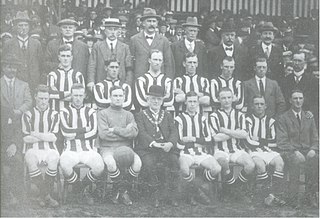Related Research Articles

Gillingham Football Club is a professional association football club based in the town of Gillingham, Kent, England. The only Kent-based club in the Football League, the "Gills" play their home matches at Priestfield Stadium. The team compete in League Two, the fourth tier of the English football league system, in the 2022–23 season.

Priestfield Stadium is a football stadium in Gillingham, Kent. It has been the home of Gillingham Football Club since the club's formation in 1893, and was also the temporary home of Brighton & Hove Albion Football Club for two seasons during the 1990s. The stadium has also hosted women's and youth international football matches and a London Broncos rugby league match.

Andrew Hessenthaler is an English football manager and former player who is head of recruitment at EFL League Two club Gillingham.
Paul William Smith is an English former professional footballer.

Andrew Lawrence Crofts is a former professional footballer who is currently a first team coach for Brighton & Hove Albion. He made 29 appearances for Wales at international level.

Gillingham Football Club is an English football club based in Gillingham, Kent. The club was formed in 1893, and played in the Southern League until 1920, when that league's top division was absorbed into the Football League as its new Division Three. The club was voted out of the league in favour of Ipswich Town at the end of the 1937–38 season, but returned 12 years later, when that league was expanded from 88 to 92 clubs. Twice in the late 1980s Gillingham came close to winning promotion to the second tier of English football, but a decline then set in and in 1993 the club narrowly avoided relegation to the Football Conference. In 2000, the "Gills" reached the second tier of the English league for the first time in the club's history and went on to spend five seasons at this level, achieving a club record highest league finish of eleventh place in 2002–03. The club has twice won the division comprising the fourth level of English football: the Football League Fourth Division championship in 1963–64 and the Football League Two championship in 2012–13.
Stephen Lovell is a Welsh former professional footballer and manager. He is currently manager of Herne Bay.
During the 1963–64 English football season, Gillingham F.C. competed in the Football League Fourth Division, the fourth tier of the English football league system. It was the 32nd season in which Gillingham competed in the Football League, and the 14th since the club was voted back into the league in 1950. Gillingham were undefeated in their first 13 games, the longest such run from the start of the season by any team in the Football League, and by the end of September were top of the league table, where they remained for much of the season, although some fans were unhappy with the team's defensive style of play.
During the 1973–74 English football season, Gillingham F.C. competed in the Football League Fourth Division, the fourth tier of the English football league system. It was the 42nd season in which Gillingham competed in the Football League, and the 24th since the club was voted back into the league in 1950. Gillingham lost three times in the first ten games of the season, but the team then began a run of 20 league games without defeat; by the end of 1973, Gillingham were second in the league table. In mid-February, they lost a Fourth Division game for the first time in more than four months, after which two consecutive wins in mid-March took them to the top of the table. Although Gillingham slipped from first place, they remained in the top three, and a victory over Colchester United on 20 April ensured that the team would be promoted to the Third Division at the end of the season. In their final game of the season on 1 May, first-placed Gillingham lost to second-placed Peterborough United, who overtook them to win the championship of the division.
During the 1999–2000 English football season, Gillingham F.C. competed in the Football League Second Division, the third tier of the English football league system. It was the 68th season in which Gillingham competed in the Football League, and the 50th since the club was voted back into the league in 1950. The team started the season in poor form, failing to win any of the first five league games, but then went on a much-improved run and began challenging for promotion to the Football League First Division. Robert Taylor scored 18 goals in 19 games by November, after which he was signed by Manchester City for £1.5 million, a new record fee for Gillingham. On the last day of the regular season, the team had a chance to gain automatic promotion, but lost and instead had to enter the play-offs. After defeating Stoke City in the semi-finals, Gillingham beat Wigan Athletic in the final to gain promotion to the second tier of the English football league system for the first time in the club's history.
Bradley Paul Dack is an English professional footballer who plays as a midfielder. He is currently a free agent.
During the 1996–97 English football season, Gillingham F.C. competed in the Football League Second Division, the third tier of the English football league system. It was the 65th season in which Gillingham competed in the Football League, and the 47th since the club was voted back into the league in 1950. In the previous season, the team had gained promotion from the Third Division. Prior to the new season, Gillingham signed seven new players, paying a new club record transfer fee for Watford's Andy Hessenthaler. The team's form was poor in the first half of the season and at the end of 1996, Gillingham were in 21st position in the 24-team league table, putting them in danger of relegation back to the fourth tier. The club signed Ade Akinbiyi from Norwich City for another record fee in early January. In the second half of the season the team's performances improved and they finished the season in 11th position in the table.
During the 1993–94 English football season, Gillingham F.C. competed in the Football League Third Division, the fourth tier of the English football league system. It was the 62nd season in which Gillingham competed in the Football League, and the 44th since the club was voted back into the league in 1950. Prior to the season, Glenn Roeder resigned as the club's manager and was replaced by Mike Flanagan. The team struggled in August and September, and did not win a Third Division match until the eighth league game of the season. A week later, Gillingham won away from home in the Football League for the first time in 18 months. Gillingham's form remained inconsistent and, although they climbed to 10th in the 22-team league table in October, the team spent most of the season in the bottom half and finished 16th.
During the 1991–92 English football season, Gillingham F.C. competed in the Football League Fourth Division, the fourth tier of the English football league system. It was the 60th season in which Gillingham competed in the Football League, and the 42nd since the club was voted back into the league in 1950. The team began the season with a 4–0 victory over Scunthorpe United but their form was inconsistent; not until February did they manage to win two consecutive league games. After a season spent largely in the middle of the league table, Gillingham finished 11th out of 22 teams in the Fourth Division.
During the 1994–95 English football season, Gillingham F.C. competed in the Football League Third Division, the fourth tier of the English football league system. It was the 63rd season in which Gillingham competed in the Football League, and the 45th since the club was voted back into the league in 1950. In January 1995, after several seasons spent near the bottom of the Football League and nearly a decade of financial difficulties, the club was declared insolvent and placed in receivership. Mike Flanagan was made redundant as the club's manager and replaced by player-coach Neil Smillie for the remainder of the season. Gillingham finished the season 19th in the Third Division, but the club's continued existence remained in doubt until June, when it was purchased by businessman Paul Scally.
During the 1990–91 English football season, Gillingham F.C. competed in the Football League Fourth Division, the fourth tier of the English football league system. It was the 59th season in which Gillingham competed in the Football League, and the 41st since the club was voted back into the league in 1950. Early in the season, Ron Hillyard, the club's long-serving goalkeeper, ended his playing career with a club record number of appearances. Gillingham's form was inconsistent in the first half of the season; after falling to 17th in the league table, the team began a lengthy unbeaten run and were 10th at the end of 1990. Around the end of March, Peter Beadle and David Crown, two of the team's regular starting forwards, were injured and both missed most of the remainder of the season. The team went 10 consecutive games without winning between the last game of March and the first of May and finished the season 15th in the Fourth Division.
During the 1997–98 English football season, Gillingham F.C. competed in the Football League Second Division, the third tier of the English football league system. It was the 66th season in which Gillingham competed in the Football League, and the 48th since the club was voted back into the league in 1950. The team started the season strongly and by the end of October were challenging for promotion, but then went on a lengthy run of games without a win which saw them slip into the bottom third of the league table in December. Results improved in the second half of the season, and Gillingham were sixth in the table with one game remaining, which would be sufficient for a place in the promotion play-offs. Results on the final day of the regular season meant that they finished in a four-way tie for the final two play-off places and missed out as they had scored the fewest goals of the four teams involved; a goalbound shot from Nicky Southall in the final seconds of the last game of the season which could have given Gillingham a win and a play-off place instead struck the goalpost and rebounded away.
During the 1937–38 English football season, Gillingham F.C. competed in the Football League Third Division South, the third tier of the English football league system. It was the 18th season in which Gillingham competed in the Football League. The team won only three times in nineteen Football League matches between August and December; in November and December they played six league games and lost every one without scoring a goal, leaving them bottom of the division at the end of 1937. Although Gillingham's performances improved in the second half of the season, with seven wins between January and May, they remained in last place at the end of the season, meaning that the club was required to apply for re-election to the League. The application was rejected, and as a result the club lost its place in the Football League and joined the regional Southern League.
References
- ↑ Triggs, Roger (2001). The Men Who Made Gillingham Football Club. Tempus Publishing Ltd. p. 10. ISBN 0-7524-2243-X.
